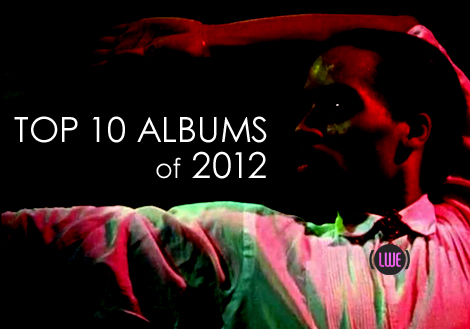
If LWE’s top 10 albums of the year list proves anything, it’s that 2012 was a great year for fearlessly experimental dance music. A rising tide of artists treated their LPs as audacious testaments to the possible rather than a convenient way to collect singles and some filler. It was such a good year, in fact, that many great albums from the likes of Cooly G, Redshape, Moritz Von Oswald Trio, Demdike Stare, Legowelt, Voices From the Lake, Bee Mask, Dean Blunt & Inga Copeland, Tin Man, Ricardo Villalobos, Silent Servant, and many more didn’t even make our list. These, then, when all is said and done with 2012, were the 10 albums which proved their worth to our dedicated editorial staff.
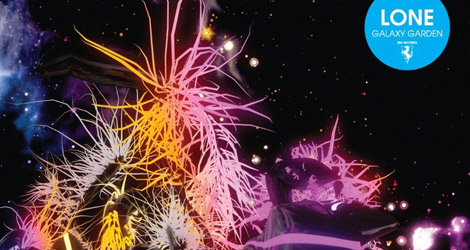
10. Lone, Galaxy Garden
[R&S Records] (buy)
For a while there, Lone had me worried. The British producer born Matt Cutler had wowed audiences with his frenetic, rave-influenced take on house music from the moment it was fully fleshed out on Emerald Fantasy Tracks, his 2010 LP. In the time since, the endless tweaks he made to this trademark sound left me wondering if Lone had anything else in him. But like getting an eye exam, where suddenly the last set of lenses snaps everything into focus, Galaxy Gardens, Cutler’s fifth album, crystallized all his best traits and pushed his whole aesthetic forward. The kaleidoscopic rotation of brightly colored melodies remained constant, but were now at play on different rhythmic patterns as Cutler fully embraced the hardcore influences bubbling under the surface. And while this kept things peppy, a palpable sense of restraint and pacing prevented the album from feeling like one long head rush. Collaborations with Machinedrum on the blistering folk ‘n bass tune “As A Child” and Anneka on the pensive closer, “Spirals,” added to the range of moods the LP strikes without diluting his sonic signature. Perhaps best of all, Galaxy Garden moves beyond the nostalgia of previous works and steps into the future, leading listeners on a dazzling adventure into the unknown. An album this accomplished and enjoyable leaves me confident that Cutler still has the aural imagination to keep his sound fresh, even if it takes some adjustment-period 12″s to get there. (Steve Mizek)
Audio clip: Adobe Flash Player (version 9 or above) is required to play this audio clip. Download the latest version here. You also need to have JavaScript enabled in your browser.
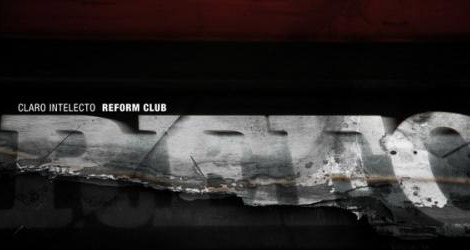
09. Claro Intelecto, Reform Club
[Delsin] (buy)
Over the course of this year, I’ve spent a lot of time immersed in Mark Stewart’s third and most accomplished album, Reform Club. For a long time, I struggled to identify its core quality — that which makes it special. There are plenty to choose from: the album’s elegant, string-like timbres, its disarmingly simple arrangements, and its incredible sense of coherence, to name a few. But there was something more elusive. With hindsight, it’s an attribute which has always lurked within the folds of the Mancunian’s creations, from his first few releases on Ai Records, to his prolific period with Modern Love, and now at his new home, Delsin. Fragile, tender, or even defeated; call it whatever you like, but Reform Club explored the boundaries of this quality with a totality and maturity that even Metanarrative, Stewart’s previous LP, did not. Tracks such as the aching, piano-led “Still Here” and the weary “Quiet Life” best exemplified this approach, though it was also audible in upbeat cuts like “It’s Getting Late” and “Reformed.” Most techno is so robust, so assured of itself. Where it’s concerned with extracting man from machine, too often that man is virile, exuberant, manic. And while these may all be human feelings too, they’re not nearly as personal as the resigned sense of heartache Reform Club seems to communicate.
(Nick Connellan)
Audio clip: Adobe Flash Player (version 9 or above) is required to play this audio clip. Download the latest version here. You also need to have JavaScript enabled in your browser.

08. Jahiliyya Fields, Unicursal Hexagram
[Long Island Electrical Systems] (buy)
It was no surprise that L.I.E.S. started to dip their toes into more abstract music this year, but perhaps the full-on swan dive that was Unicursal Hexagram caught many unaware. This wasn’t beatless ambient music for starting your next techno podcast, but rather rhythmic, noisy electronics for the end times. Tracks like “Servant Garden” twisted sharp arpeggios with Middle Eastern modes, while the heady plod of “Air On Earth” grabs you by the cerebellum and pummels until your limbs follow suit. The album’s first slab of vinyl dug deep, deep down into the muck, lighting ceremonial candles to Aiwass along the way in the likely possibility that you’ll lose your path home, much as Dante did. The second side contrasted, lifting up, especially with the devotional white noise washes and metallic grinding of “White Cabbage.” Unicursal Hexagram was dance music for the dark hours, inducing hysteria among even the most ardent of beat freaks by producing incredibly physical music: the sounds locked into bewitching grooves, the highs screeched and squirmed, and the lows kicked skeletons with iron-tipped boots. Few records sounded like it this year, and you get the feeling that very few ever will. (Chris Miller)
Audio clip: Adobe Flash Player (version 9 or above) is required to play this audio clip. Download the latest version here. You also need to have JavaScript enabled in your browser.

07. Laurel Halo, Quarantine
[Hyperdub] (buy)
Since 2010, Laurel Halo (Laurel Anne Chartow, aka King Felix, or Ina Cube) has released two EPs, which situate her work between Detroit techno’s futurist rush and the belted vocals and synthetic muscularity of modern pop. Quarantine, her debut LP, garnered a divided response upon its spring release, as many seemed to hope she would flesh out these characteristics for the format. However, this expectation is entirely facile, as it underrates Chartow’s abilities as a composer. Quarantine isn’t devoid of hooks, but it’s as confrontational as it is choral, and free-floats between evocations like an ode to transience. Underpinned by resonant, intestinal sub-bass and soaring syntheses, it has a sense of shambolic magnitude about it, suggesting a looming expanse which is coming apart at the seams. Chartow sounds assertive, helpless, resigned, and her voice shifts in range and audio quality in complement; her cryptic poetry conjures a wealth of imagery at every turn: airport security checkpoints, indoor sterility, missed connections, “once-a-century” storms, snatches of impassioned radio pop, and passengers of packed commuter vehicles fixated on their smartphones. If Quarantine isn’t the year’s finest LP, it’s at least a worthy contender for a time capsule. Few records offer such vivid, visceral document of our era. (Steve Kerr)
Audio clip: Adobe Flash Player (version 9 or above) is required to play this audio clip. Download the latest version here. You also need to have JavaScript enabled in your browser.
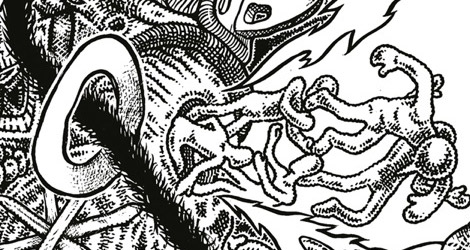
06. Shackleton, Music For The Quiet Hour / The Drawbar Organ EPs
[Woe To The Septic Heart!] (buy)
With Music for the Quiet Hour and The Drawbar Organ EPs, Shackleton moved his dense and hypnosis-inducing tribal rhythmic bent into areas of quasi-religious fervor and intense focus. Music for the Quiet Hour was an hour-long — and often beatless — foray into cinematic grandeur. All classic Shackleton tropes were present — disembodied voices and mauve atmospherics that spoke of sex, death, and the passage of time. The Drawbar Organ EPs, meanwhile, offered a fearsome bass-laden attack with an emphasis on electric organ samples, lending the project a twisted and hymeneal aspect. No other producer working in electronic music (and, to be honest, very few working outside of it) taps the throughline between clammy dread and awe-struck epiphany in such visceral terms as Shackelton — listening to this masterpiece, you may quite reasonably wonder if anybody will again. (Harry Sword)
Audio clip: Adobe Flash Player (version 9 or above) is required to play this audio clip. Download the latest version here. You also need to have JavaScript enabled in your browser.
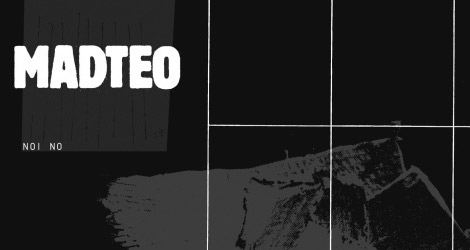
05. Madteo, Noi No
[Sähkö Recordings] (buy)
The anticipation around Madteo’s third LP was palpable. Closing out a busy year that saw releases on labels like Rabih Beaini’s Morphine, Joy Orbison and Will Bankhead’s Hinge Finger, and Bankhead’s The Trilogy Tapes, Noi No seemed destined to receive a rapturous critical response. The Queens-based producer Matteo Ruzzon is suspicious of the hype too, and Noi No is the rare album that deftly confounds the Internet’s myopic expectations as a matter of course. The real story is in the way Madteo’s latest largely casts off the (already shifty) beats of his other releases, leaving gaping spaces filled in with a slurry of samples and the odd mutant rhythm, usually left more implied than explicit. Noi No is a strange realm, governed by its own set of laws that make more sense the deeper you plunge in. By the time you’ve perceived something tangibly related to dance music, change is well under way or complete, but what seems at first to be a free fall gradually resolves into its own digressive sense with every listen. As abstract and malleable as it can get, the uncompromising Noi No finds indirect ways of giving you your bearings, softening the learning curve and bringing you back: its most static moments, like the obsessive chords of “Gory Glory,” are undercut by subliminal sparks of life more felt that directly perceived. Likewise, its most restless cuts, like the Drake-sampling “Rugrats Don’t Techno for an Answer,” are balanced by a meditative stillness and a sense of improvised but thoughtful structure. As weary and wary of hype as we’ve become, Noi No‘s imaginative power make it an iconoclastic, deeply felt contribution to an adventurous year in dance music — there’s enough vision and energy here to go from puzzling to the head of the pack. (Brandon Bussolini)
Audio clip: Adobe Flash Player (version 9 or above) is required to play this audio clip. Download the latest version here. You also need to have JavaScript enabled in your browser.
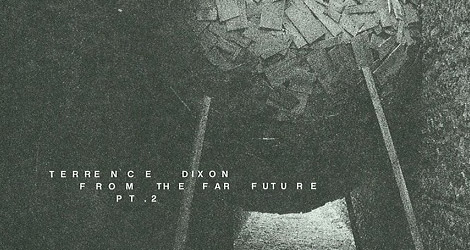
04. Terrence Dixon, From The Far Future Pt. 2
[Tresor] (buy)
12 years ago, Terrence Dixon presented us with his vision of the future in his uncompromising, inimitable style. His updated manifesto in 2012 shows he’s still crafting techno not of this time, serving a brutal reminder to anyone who thought Detroit techno was a movement that happened in the 90’s or a cliché term to be attributed to any track with a moody chord progression. From The Far Future Pt. 2 does not welcome you with open arms, and it doesn’t invite you to stay. It’s a calculating, relentless surge of data transmitting from the void of space, and in there lies its brilliance. (Per Bojsen-Moller)
Audio clip: Adobe Flash Player (version 9 or above) is required to play this audio clip. Download the latest version here. You also need to have JavaScript enabled in your browser.

03. Andy Stott, Luxury Problems
[Modern Love] (buy)
When Andy Stott turned his attention to long-form narrative in 2011 with his twin mini-LPs We Stay Together and Passed Me By, we witnessed the producer descend into the murky depths of his own sound design. Each track felt like it burned with the remaining charge of a machine that had been pulled from its socket, a frame-by-frame audible snapshot of hope detonating. By contrast, Luxury Problems sounds like the producer ascending from those lamp-lit caverns; the surroundings are at times still bleak and foreboding, but light penetrates, often by way of the angelic vocals from Alison Skidmore. Treacle-slow and imbued with the weight of dark matter, Luxury Problems was still a breath-taking ride from start to finish. (Per Bojsen-Moller)
Audio clip: Adobe Flash Player (version 9 or above) is required to play this audio clip. Download the latest version here. You also need to have JavaScript enabled in your browser.
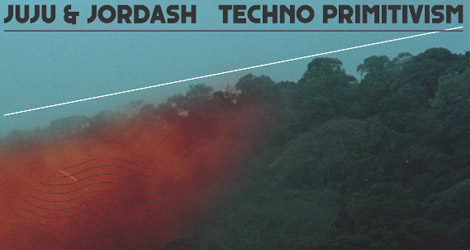
02. Juju & Jordash, Techno Primitivism
[Dekmantel] (buy)
Learning from jazz improvisation, Juju & Jordash have taken an absorbingly unburdened road to interpreting house music. And during the last decade, through a series of methodical and carefully calibrated analog experiments, they’ve clearly become experts in defining vast terrains, in which they position their idiosyncratic blend of dub and kosmische influences. This year’s album, Techno Primitivism, continues to stretch the upper and lower limits of their sound, taking techno as a starting point but bravely veering off into a cinematic array of historical tangents. Their generally unplaceable variations on ethnic echoes, parallel industrial textures and some of the most refined house idioms of 2012, return us to the genesis of those conventions, relieving us of the pressures of their time through technological accident and the liberated contingency of the club. The tracks function as rhythmic plateaus, filled with clusters of creeping tension, suddenly atomized into a mist of reverb. Whether it’s guitars, harmonica, splashy drums, keening synths, or deep bass lines, the instruments are engaging in a way that’s all too rare in electronic music nowadays, and Juju & Jordash’s sonic curiosity only emphasizes the importance of how one uses the form. Although the title of the album refers to some sort of primitivism, don’t let it fool you: the music here is all about Technicolor imagination and high quality, which easily makes it one of definitive standouts of the year. (Dino Lalic)
Audio clip: Adobe Flash Player (version 9 or above) is required to play this audio clip. Download the latest version here. You also need to have JavaScript enabled in your browser.

01. Actress, R.I.P
[Honest Jon’s Records] (buy)
My rule of thumb for judging a truly revelatory record is how long the first listen takes. General practice upon uncovering a great album is an initial spin followed by that immediate urge to jump back to the beginning. But every so often you encounter a release that can take forever to make it all of the way through, like my earliest tryst with R.I.P, which arrived tethered to an inscrutable amount of hype given the massive dent that Splazsh left in 2010. I remember receiving a promo copy back in March, giddily firing it up while sitting at my desk, and only being able to make to the detached flicker of “Jardin” before rewinding back to the start, grabbing my forehead in bemusement while trying to rationalize exactly what I was hearing. It took me a week to make it through the whole thing — and even today, it’s about three hours of repeated rewinds per single listen. The reason it’s so difficult to place what you’re listening to with R.I.P is because it really doesn’t resemble anything that’s come before. Even within the grounds of Actress’ cannon, it’s largely devoid of the frayed edges that defined his previous work. It intentionally drifts in construct, but every sound is deliberate. And during a year where disorientingly compressed house and techno reigned supreme, it only sounds further uncontaminated. If you encounter a DJ with enough gall to play it out, it’ll stop you dead in your tracks. There’s little conceptual context to which you can relate it. As such, we were left with a number of reviews-cum-think-pieces examining the album in the context of death. But the John Milton ties were only relevant because he stated as much. If he had told us his primary draw of inspiration was literally anything else, we would’ve had to believe him. Because, well, all the world is Actress’, and we men and women, merely players. (Michael C. Walsh)
Audio clip: Adobe Flash Player (version 9 or above) is required to play this audio clip. Download the latest version here. You also need to have JavaScript enabled in your browser.













Α lot of great albums this year…Missed SS, DD, and Robert Hood on this list, but very good picks nonetheless!
FIVE IS THE NUMBER
big ups Actress + Juju & Jordash
Madteo LP has grown on me after a few listens…
It’s really nice that you share your ethereal/experimental records list. Now I want a really techno/house one. Thank you.
A better list than most I’ve seen, but no Robert Hood?!?!
10 albums but only 5 eps (with sorta pointless restrictions) in yer run down of the year?
Some good choices in here, no way was the Actress album better than the Jujus tho; fan of both too.
All five EPs were written up by Chris by himself, who was also tackling the top artists list, while the albums list was contributed to by the whole staff. Had to keep things reasonable.
i see yis are doing a top 25 tracks thing now anyways. ignore me! 😉
Definitely one of the more interesting lists I’ve seen, which is awesome. Here’s my own Top 50 list:
http://mattneric.com/2012/12/20/top-50-albums-of-2012-matts-list/
Nice list but no individual staff charts this year? 10 albums is too few for this year.
Individual staff lists will be published next Monday.
Excellent.
[…] / Ninjatune] In our 2012 wrap coverage, I attempted to justify our selection of Actress’ R.I.P as the top album by noting that no […]